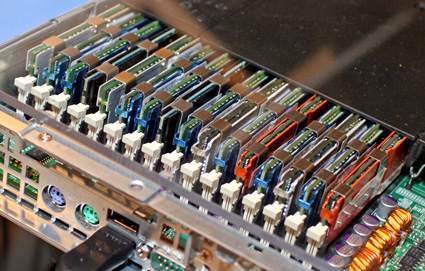Magnetic Memory Manipulated by Voltage, Not Just Heat
Scientists at Tsinghua University in Beijing, China may have discovered a big puzzle piece in the overall search for much more power-efficient data storage devices.
Get Tom's Hardware's best news and in-depth reviews, straight to your inbox.
You are now subscribed
Your newsletter sign-up was successful
Magnetic memory devices that are controlled by voltage and not by heat have been researched for decades, but research earlier this year showed that the coercive force of magnetic materials is controlled by heat and not by voltage.
The Chinese scientists now claim that those research results were wrong and that coercivity can be controlled by voltage. Coercivity is the intensity of a magnetic field that is necessary to demagnetize a magnet when it is fully magnetized.
The hope of the storage industry is that using voltage-induced magnet control will lead the path to storage technologies that use much less power than the products we know today.
The scientists said that they explored coercivities in three structures that are "commonly used in magnetic memory experiments" and discovered that heat is not at all responsible for the changes of a magnet's coercivity, but voltage is. Without providing details publicly, the Journal of Applied Physics, which published their paper, said that their results show that voltage is directly controlling changes in the magnetic properties of all three of the tested materials. "For example, the researchers demonstrate that the effect can be turned on and off almost instantaneously, whereas the changes should lag if heat is the cause."
There was no information what further research is necessary and how quickly the findings could result in actual new technologies and new products.
Get Tom's Hardware's best news and in-depth reviews, straight to your inbox.

Douglas Perry was a freelance writer for Tom's Hardware covering semiconductors, storage technology, quantum computing, and processor power delivery. He has authored several books and is currently an editor for The Oregonian/OregonLive.
-
Pyree To make it easier for those interested, I linked the journal here.Reply
http://jap.aip.org/resource/1/japiau/v110/i4/p043919_s1?isAuthorized=no -
amigafan "almost instantaneously"? Well that's not instantaneous enough for computing performance expected today :|Reply
However if it uses less power than SRAM it will surely find it's purpose. -
Pyree No, I don't see it saying almost instantaneously in the journal.Reply
"The increasing voltage leads to more and more obvious change of Hc, but after switching-off the voltages each time, the DHc goes back to around zero instantaneously" (Wang et al. 2011)
-
amigafan PyreeNo, I don't see it saying almost instantaneously in the journal."The increasing voltage leads to more and more obvious change of Hc, but after switching-off the voltages each time, the DHc goes back to around zero instantaneously" (Wang et al. 2011)"For example, the researchers demonstrate that the effect can be turned on and off almost instantaneously, whereas the changes should lag if heat is the cause."Reply -
ik242 @amigafan, that was sentence from the this page article, written by THG journalist not by researchers.Reply -
The key to perpetual motion is here... now if we can just figure out displacement in order to bypass inertia, then off to Xanadu we go =)Reply
-
noblerabbit I wonder what the next ASUS chinese marketing slogans will be brought to the table with this. Either way, here is hoping to affordable 20TB storage by the end of next 2 or so years.Reply
